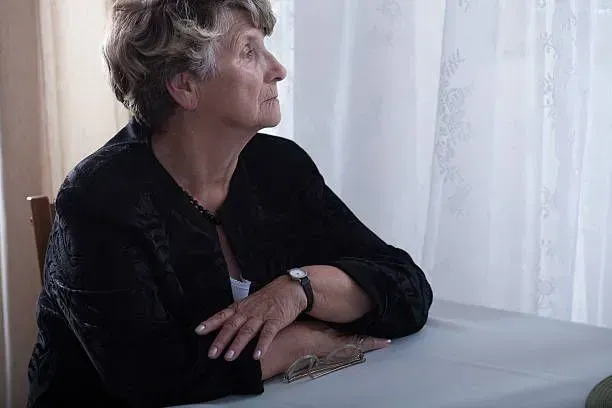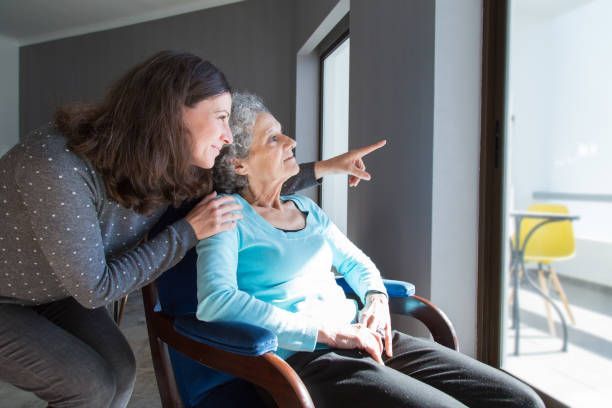10 Tidbits About Seasonal Depression
Johns Hopkins explains "seasonal affective disorder, or SAD, is type of depression. It happens during certain seasons of the year—most often fall or winter. It is thought that shorter days and less daylight may trigger a chemical change in the brain leading to symptoms of depression. Light therapy and antidepressants can help treat SAD."
More, according to Mayo Clinic "people who have bipolar disorder are at increased risk of seasonal affective disorder. In some people with bipolar disorder, episodes of mania may be linked to a specific season. For example, spring and summer can bring on symptoms of mania or a less intense form of mania (hypomania), anxiety, agitation and irritability. They may also experience depression during the fall and winter months."

As the days grow shorter and sunlight becomes a scarce commodity, many individuals find themselves grappling with the onset of seasonal depression, also known as Seasonal Affective Disorder (SAD). At 7 Day Home Care, we recognize the profound impact this condition can have on well-being, particularly during the fall and winter months. Understanding the nuances of seasonal depression is essential for providing compassionate and effective care to those navigating its challenges. In this article, we delve into key aspects of seasonal depression, shedding light on its symptoms, contributing factors, and strategies for support.
- Seasonal Pattern: Seasonal depression, or Seasonal Affective Disorder (SAD), typically occurs during the fall and winter months when daylight decreases. The reduced exposure to natural light during this period is thought to play a pivotal role in triggering the onset of symptoms. As daylight hours decrease, individuals with SAD may undergo shifts in mood, energy levels, and sleep patterns. Interestingly, some individuals experience an improvement in symptoms during the brighter days of spring and summer. This cyclic pattern underscores the significance of light exposure in influencing the mood and overall well-being of those affected by seasonal depression.
- Common Symptoms: Seasonal depression manifests with a distinctive set of symptoms typically occurring during fall and winter months. Individuals grappling with this condition often experience a notable shift in mood, characterized by persistent feelings of sadness or low energy. Changes in sleep patterns, such as oversleeping or difficulty in staying asleep, may accompany these emotional shifts. Irritability, a decreased ability to concentrate, and a general sense of lethargy are also common symptoms. Appetite changes, particularly a tendency to crave carbohydrates, can be prevalent. The cumulative effect of these symptoms underscores the importance of recognizing and addressing seasonal depression to promote mental well-being during challenging times of the year.
- Daylight Influence: The influence of daylight plays a crucial role in the dynamics of seasonal depression. As the days shorten during fall and winter, individuals susceptible to SAD may experience a decline in exposure to natural sunlight. This reduction in daylight has far-reaching effects on the body's internal clock, disrupting circadian rhythms and hormonal balances. The lack of sunlight exposure is believed to contribute to the onset of SAD symptoms, including low mood, lethargy, and changes in sleep patterns. Light therapy, a common treatment for SAD, aims to mitigate these effects by exposing individuals to bright artificial light, effectively compensating for the diminished natural light during the darker seasons. Understanding the intricate relationship between daylight and seasonal depression is pivotal in developing strategies to manage and alleviate its impact on mental well-being.
- Prevalence: The prevalence of seasonal depression varies across geographical regions but is a recognized phenomenon worldwide. While it is more commonly reported in areas with pronounced seasonal changes, SAD can affect individuals living in diverse climates. In regions farther from the equator, where daylight hours significantly fluctuate between seasons, the occurrence of SAD tends to be higher. However, it's important to note that SAD is not exclusive to these areas, and cases have been documented in locations with milder seasonal variations. The global recognition of SAD underscores the importance of understanding and addressing the impact of changing seasons on mental health across different communities and climates.
- Spring and Summer Improvement: Interestingly, for some individuals grappling with Seasonal Affective Disorder (SAD), relief often comes with the arrival of spring and summer. As daylight hours lengthen and natural light becomes more abundant, those affected by SAD may experience a notable improvement in their mood and overall well-being. The brighter and sunnier conditions during these seasons are believed to positively influence the body's internal clock and circadian rhythms, mitigating the symptoms associated with seasonal depression. This seasonal reprieve underscores the intricate relationship between light exposure and mental health, offering individuals a respite from the challenges typically encountered during the darker and colder months. Understanding these fluctuations throughout the year is crucial in tailoring effective interventions and support for individuals navigating the complexities of SAD.
- Light Therapy: Light therapy, a widely recognized and effective treatment for SAD, involves exposure to bright artificial light that mimics natural sunlight. This therapeutic approach aims to compensate for the reduced daylight hours during fall and winter, which can trigger the onset of SAD symptoms. The intense light, typically emitted from a lightbox, stimulates the retina and sends signals to the brain, regulating circadian rhythms and neurotransmitter levels. Regular use of light therapy, usually for around 20-30 minutes each day, has been shown to alleviate the symptoms of SAD, including low mood, lethargy, and disruptions in sleep patterns. Its convenience and non-invasive nature make light therapy a valuable option for individuals seeking relief from the seasonal challenges of depression, providing a beacon of hope during darker times of the year.
- Vitamin D Connection: The vitamin D connection to SAD underscores the intricate relationship between sunlight exposure and mental health. During fall and winter, when daylight hours are limited, individuals may experience a decrease in natural sunlight exposure, leading to a potential decline in vitamin D levels. Vitamin D, synthesized in the skin in response to sunlight, plays a crucial role in various bodily functions, including mood regulation. Some studies suggest that low levels of vitamin D may be associated with an increased risk of developing SAD. While the exact mechanisms are not fully understood, the vitamin D connection highlights the importance of considering nutritional factors and sunlight exposure in managing and preventing seasonal depression. Incorporating strategies to maintain adequate vitamin D levels, such as dietary supplements and monitored sun exposure, can be a complementary approach in addressing the complexities of SAD.
- Risk Factors: Several factors contribute to the risk of developing SAD. Individuals with a family history of depression may be genetically predisposed to SAD, suggesting a hereditary component. Gender also plays a role, as women are more commonly affected than men. Geographical location matters, with SAD being more prevalent in areas farther from the equator, where seasonal changes in daylight are more pronounced. Additionally, age can influence susceptibility, with young adults having a higher risk. Other risk factors include pre-existing mental health conditions, such as major depressive disorder or bipolar disorder, and certain lifestyle factors like a lack of exposure to natural light, sedentary behavior, and inadequate sleep. Recognizing these risk factors is crucial for early intervention and targeted support for individuals susceptible to the seasonal challenges of depression.
- Professional Help: Seeking professional help is a crucial step for individuals grappling with SAD. Mental health professionals, including psychiatrists, psychologists, and counselors, are equipped to provide a comprehensive assessment of symptoms, offer a diagnosis, and tailor evidence-based treatments to address the specific challenges of seasonal depression. Therapeutic interventions may include psychotherapy, cognitive-behavioral therapy (CBT), and, in some cases, medication. It's essential for individuals experiencing persistent or severe symptoms to reach out to healthcare providers for guidance. Many mental health professionals are well-versed in understanding the seasonal nuances of depression and can collaborate with patients to develop personalized treatment plans. Recognizing the availability of professional support and taking proactive steps to access it ensures that individuals facing the impact of seasonal depression can navigate the challenges with guidance and expertise, promoting overall mental well-being.
- Lifestyle Strategies: Implementing lifestyle strategies is integral in managing SAD and enhancing overall well-being during challenging seasons. Regular exposure to natural light, even on overcast days, can be beneficial, emphasizing outdoor activities when possible. Engaging in a consistent exercise routine, known to boost mood and reduce stress, proves valuable. Prioritizing a balanced diet with an emphasis on nutrient-rich foods and adequate hydration supports physical and mental health. Establishing a regular sleep schedule helps regulate circadian rhythms, contributing to mood stability. Mindfulness practices, such as meditation and deep-breathing exercises, can alleviate stress. Cultivating a supportive social network and seeking professional help when needed are vital components of a holistic approach to managing seasonal depression. These lifestyle strategies empower individuals to proactively address the unique challenges posed by SAD, fostering resilience and promoting a healthier mental state.
At 7 Day Home Care, we are committed to fostering a holistic approach to care that addresses the unique needs of individuals facing seasonal depression. By acknowledging the impact of changing seasons on mental health and promoting strategies like light therapy, outdoor activities, and personalized support, we aim to empower our community to navigate these challenges with resilience. As advocates for well-being, we encourage open conversations, professional guidance, and a compassionate understanding of the complexities surrounding seasonal depression. Together, let us strive to create an environment where individuals can find comfort, support, and the tools they need to thrive throughout the seasons.
7 Day Home Care stands as a dedicated provider of in-home care services, extending its compassionate support across various locations, including Manhattan, Queens, Brooklyn, Nassau County, and Suffolk County in New York. Our commitment to enhancing the quality of life for individuals in need is reflected in our person-centered care approach, tailoring services to meet the unique needs of each client. At 7 Day Home Care, we understand the significance of the client-caregiver relationship, and our matching services ensure a harmonious and personalized caregiving experience. Recognizing the diverse healthcare needs of our community, we specialize in Alzheimer's and dementia care, respite care, stroke recovery, chronic disease management, and cancer care. We invite you to contact us today at 516-408-0034 or at 7 Day Home Care to discover how our dedicated team can provide the highest level of care and support, fostering a nurturing environment for the well-being of your loved ones.
Brian Callahan
7 Day Home Care










